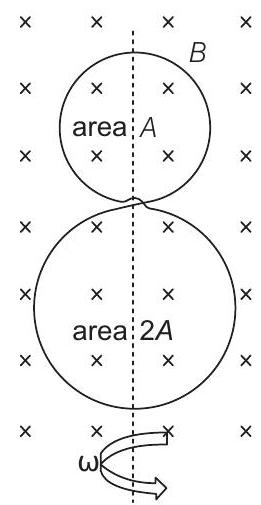Electromagnetic Induction and Alternating Current 1 Question 9
####9. A circular insulated copper wire loop is twisted to form two loops of area

(a) The emf induced in the loop is proportional to the sum of the areas of the two loops.
(b) The rate of change of the flux is maximum when the plane of the loops is perpendicular to plane of the paper.
(c) The net emf induced due to both the loops is proportional to
(d) The amplitude of the maximum net emf induced due to both the loops is equal to the amplitude of maximum emf induced in the smaller loop alone.
Show Answer
Answer:
Correct Answer: 9.
Solution:
- The net magnetic flux through the loops at time
So,
The emf induced in the smaller loop,






